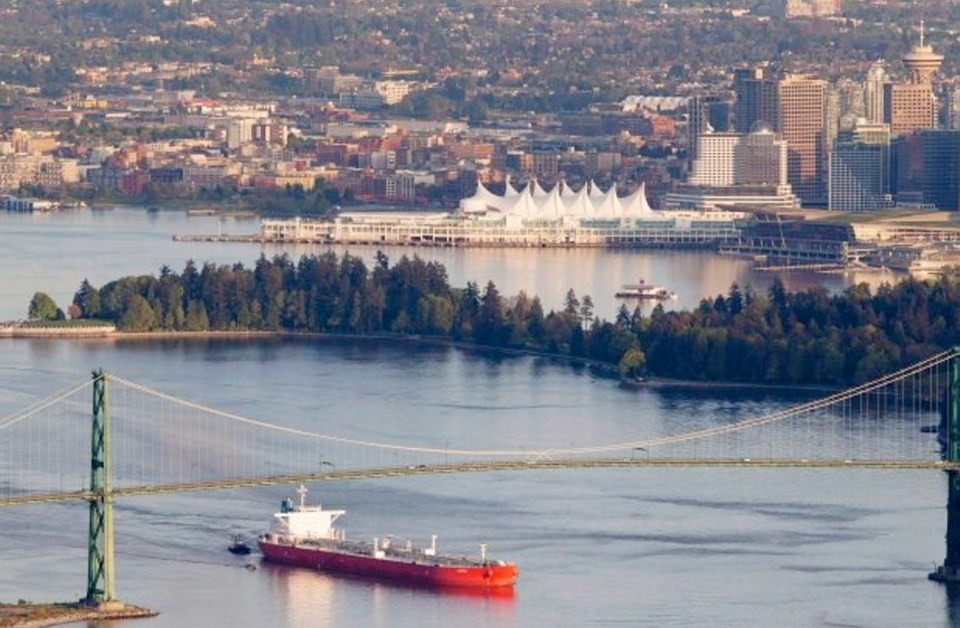 Opposition B.C. Liberals are hypothesizing a hidden potential side-effect in Alberta’s legislative move to send B.C. gas prices sky-high. It could also wind up increasing the number of tankers serving the existing pipeline, regardless of whether the expansion project goes ahead.
Opposition B.C. Liberals are hypothesizing a hidden potential side-effect in Alberta’s legislative move to send B.C. gas prices sky-high. It could also wind up increasing the number of tankers serving the existing pipeline, regardless of whether the expansion project goes ahead.
Kamloops Liberal MLA Peter Milobar raised that prospect in the legislature this week with Environment Minister George Heyman, as the implications of Alberta Premier Rachel Notley’s move continued to reverberate across Canada.
The scenario under which tanker traffic could keep increasing regardless of whether the pipeline is expanded involves what’s currently transported in the line. It’s unique, in that different kinds of petroleum products can be put through it, in batches. If Notley’s government makes Monday’s bill law, the energy minister would have the authority to regulate what product goes into the line.
The government’s stated objective in the run-up to the bill was to punish and inflict pain on B.C. by restricting the flow of refined fuel, in order to hike the price of gasoline on the coast. Limiting the amount of westbound gasoline would have another consequence. It would make more room in the existing pipeline for crude oil. Running more heavy crude through the pipeline, which is conceivable in the new circumstances, could require more tankers to handle it once it arrives in Vancouver harbour.
The scenario is based on a lot of conjecture, and experts say there are a lot of complicating factors. Some heavy crude goes to Washington state refineries and some is processed in Burnaby. So the link between more crude oil in the pipeline and more tanker traffic isn’t a direct one. And it is still up to producers if they want to ship anything. The Alberta government can regulate oil flows, but it can’t dictate them.
But there’s enough in the background to make it worth considering. The preamble to Alberta’s “Preserving Canada’s Economic Prosperity Act” says it’s about maximizing value and optimizing the interests of Albertans prior to authorizing the export of oil.
Milobar said in the house that the highest dollar return for producers is getting crude oil into tankers, because it gets sold at higher world-market prices. He said there’s a real possibility that the existing line could be dedicated to heavy oil for offshore shipment. That would fulfil the stated purpose of the act — maximize value and optimize Alberta’s interests.
The anti-pipeline side would cheer if the expansion were halted, because it would subtract one tanker a day from the marine traffic. But the volumes on the existing line could be changed in a way that would require more tankers to handle.
The kicker would be that they would sail without the marine-safety improvements that were promised as part of the expansion. About $150 million worth of work on the marine-spill bases was put on hold while Kinder Morgan waits for a green light from B.C. for the project.
Milobar asked Heyman about the potential for an increase in tankers with no marine-safety upgrades. Heyman said there was so much speculation it was impossible to answer.
The Liberals have also been relying lately on vessel-tracking apps to make points about tanker shipments. For all the argument about the potential for an oil tanker-a-day sailing out of Vancouver, they’re already a standard feature in the Salish Sea.
As the argument raged Monday, Liberal MLA Ellis Ross said: “Right now there is a 251-metre crude-oil tanker called Eagle Bay less than five kilometres off the coast of East Sooke Park.”
They counted more than a dozen tankers in the vicinity last week, most of them bound for Washington refineries, but sailing just a few kilometres from the legislature.
The centrepiece of all the NDP’s objections to the pipeline expansion has always been the threat of a tanker spill on the marine environment. But cancelling the expansion doesn’t automatically equate to stopping — or even reducing — tanker traffic.
Just So You Know: Attorney General David Eby took a dangerous public position Monday. He said Alberta is “bluffing” with the bill.
“The legislation is a bluff and they don’t intend to use it.”
Calling a bluff is just as precarious as making one.



